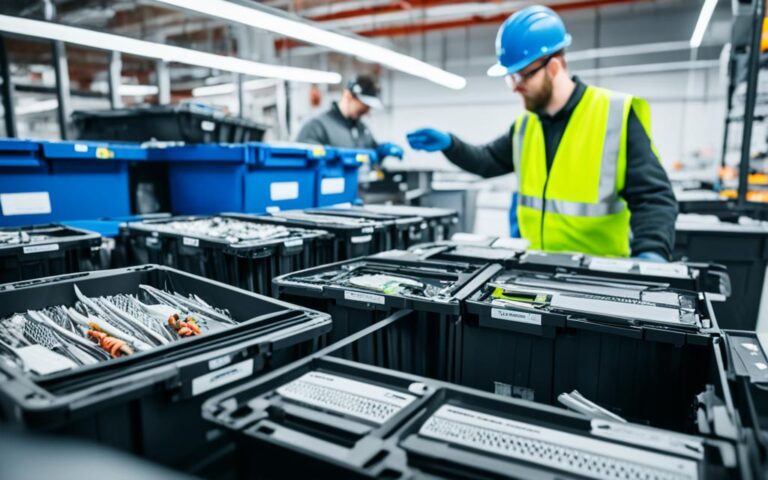Server Recycling: How It Supports Global Sustainability Goals
In today’s rapidly evolving digital landscape, the importance of sustainability cannot be underestimated. As businesses strive to minimize their environmental impact and contribute to global sustainability goals, server recycling emerges as a crucial practice. By recycling servers, companies can take proactive steps towards reducing energy consumption, minimizing electronic waste, and enhancing their compliance with environmental standards.
Server recycling plays a pivotal role in supporting global sustainability goals. As businesses increasingly rely on dedicated servers for their operational needs, the environmental impact of these servers becomes more significant. From energy usage to carbon emissions, the environmental consequences are undeniable. Therefore, adopting sustainable practices in server management is essential to mitigate the negative effects and pave the way towards a greener future.
By recycling servers, businesses can significantly decrease their energy consumption, resulting in lower operating costs and reduced reliance on non-renewable energy sources. The integration of sustainable server management techniques also helps in reducing carbon footprint, contributing to the global fight against climate change.
In addition, server recycling plays a vital role in minimizing electronic waste. With the rapid turnover of technological advancements, outdated servers can end up in landfills, polluting the environment. However, through proper recycling and disposal processes, businesses can ensure that valuable materials are recovered, reducing the strain on natural resources and promoting a circular economy.
When businesses prioritize sustainability in their server operations, they not only align themselves with global sustainability goals but also enhance their brand image. Stakeholders, including customers, partners, and investors, are increasingly attracted to environmentally conscious businesses. By choosing a sustainable server provider that emphasizes responsible server recycling, businesses can highlight their commitment to environmental stewardship and attract like-minded individuals.
Furthermore, selecting a sustainable server provider is essential due to the array of benefits it offers. Apart from ensuring the proper disposal of servers, these providers often integrate energy-efficient practices, resource conservation, and ecological supply chain management into their operations. This commitment to sustainability not only enhances operational efficiency but also drives technological innovation and positions businesses for long-term profitability and resilience.
In conclusion, server recycling plays a crucial role in supporting global sustainability goals. By choosing to recycle servers and partnering with sustainable server providers, businesses can contribute to the preservation of our environment while reaping numerous benefits. It is a win-win situation that allows businesses to reduce energy consumption, minimize electronic waste, enhance brand reputation, and position themselves as leaders in both sustainability and technological innovation.
Advantages of Sustainability In the Context of Dedicated Servers
Sustainable practices in dedicated server management offer numerous advantages. Firstly, they drastically decrease energy use, resulting in lower operating costs and reduced reliance on fossil fuels. By adopting energy-efficient technologies and optimizing server utilization, businesses can achieve significant energy savings while maintaining their operational requirements.
Secondly, sustainable server management techniques reduce the carbon footprint of data centers, thereby making a positive contribution to the fight against climate change. Data centers are known for their substantial energy consumption and associated carbon emissions. By implementing sustainable practices such as utilizing renewable energy sources, improving cooling efficiency, and adopting virtualization, businesses can minimize their environmental impact and contribute to a greener future.
Thirdly, these practices minimize electronic waste by promoting recycling and the use of modular parts. Hardware upgrades and migrations often result in discarded servers and components that end up in landfills. By embracing sustainability, businesses can prioritize the recycling and reutilization of server equipment, reducing electronic waste generation and conserving valuable resources.
Additionally, businesses that prioritize sustainability in their server operations enhance their brand image by showcasing their commitment to environmental responsibility. As sustainability becomes an increasingly important factor in consumer decisions, businesses that align their operations with sustainable practices can attract environmentally conscious customers and gain a competitive edge in the market.
Moreover, sustainable server management practices not only comply with environmental regulations but also drive technological innovation. By investing in sustainable technologies and methodologies, businesses can stay ahead of the curve and adapt to emerging environmental standards and industry trends.
Ultimately, sustainable server management leads to long-term profitability and resilience. By reducing energy costs, minimizing environmental impact, and attracting environmentally conscious customers, businesses can establish themselves as leaders in sustainability while ensuring their long-term success.
“Sustainability is not just about doing the right thing for the planet; it’s also about doing the right thing for your business.”
– Leading Sustainability Expert
Benefits of Sustainable Server Management:
- Significant energy savings and lower operating costs
- Reduced carbon footprint and contribution to climate change mitigation
- Minimized electronic waste through recycling and modular utilization
- Enhanced brand image and attraction of environmentally conscious customers
- Compliance with environmental regulations and driving technological innovation
- Long-term profitability and resilience in a changing business landscape
The Impact of Dedicated Servers on the Environment
Dedicated servers have a significant environmental impact due to their energy usage, cooling needs, and carbon emissions. These servers consume large amounts of electricity, contributing to the growing energy use of the global digital ecosystem and greenhouse gas emissions.
Data centers face challenges in dissipating the heat produced by servers, leading to the energy-intensive nature of cooling techniques. Furthermore, the disposal of electronic waste from dedicated servers poses a serious environmental concern. To mitigate these impacts, it is crucial to utilize renewable energy sources and implement sustainable practices in server management.
| Environmental Impact Factors | Implications |
|---|---|
| Energy Usage | Contributes to increasing energy consumption and greenhouse gas emissions. |
| Cooling Needs | Requires energy-intensive cooling techniques to dissipate server heat. |
| Electronic Waste Disposal | Presents challenges in responsible e-waste management. |
“We must recognize the environmental impact of dedicated servers and take proactive steps to minimize their carbon footprint. By embracing sustainable practices, we can ensure a more eco-friendly digital landscape for future generations.” – Sustainability Expert
Addressing the impact of dedicated servers on the environment is crucial for long-term sustainability. By adopting renewable energy sources, improving energy efficiency, and implementing sustainable practices in server management, businesses can reduce their carbon footprint and contribute to global environmental goals.
Next, we will discuss various methods and approaches businesses can take to promote sustainability in server management and minimize the environmental impact of dedicated servers.
Methods and Approaches for Sustainability
Promoting sustainability in server management involves adopting various methods and approaches. By implementing these strategies, businesses can prioritize environmental responsibility and support long-term sustainability. Let’s explore some key methods:
- Energy Management and Efficiency: Optimize server configurations, utilize energy-efficient hardware, and implement power management techniques to minimize energy consumption.
- Reducing Emissions and Carbon Footprint: Implement carbon reduction initiatives, utilize renewable energy sources, and explore carbon offset programs to minimize the environmental impact of server operations.
- Recycling and Waste Management: Promote responsible e-waste disposal by partnering with certified recycling facilities. Adopt circular economy principles by encouraging server recycling, refurbishment, and reuse.
- Water Conservation and Usage: Implement water-saving technologies in server cooling systems and monitor water usage to reduce consumption and waste.
- Ecological Supply Chain Administration: Collaborate with environmentally conscious server providers who prioritize sustainable practices throughout their supply chains.
By evaluating and implementing these sustainability criteria, businesses can minimize resource depletion, improve energy efficiency, and contribute to a circular economy in the IT sector. Aligning with server providers that prioritize environmental responsibility ensures a collective effort towards a sustainable future.
Embracing Sustainability: A Quote to Inspire
“Sustainability is not just about adopting a few green practices; it’s a mindset shift towards creating a better future for generations to come.” – Sir Richard Branson
Challenges and Opportunities to Sustainability
The IT sector faces several sustainability challenges that require innovative solutions and collaborative efforts. Excessive energy consumption, e-waste generation, resource depletion, and maintaining a sustainable supply chain are key areas of concern. However, it is crucial to recognize that these challenges also present opportunities for businesses to drive positive change and contribute to global sustainability goals.
By addressing these challenges head-on, businesses can unlock a range of opportunities for improvement and innovation. Reducing energy consumption not only helps minimize environmental impact but also leads to cost savings and increased operational efficiency. Implementing effective e-waste management practices not only reduces waste but also enables the recovery of valuable resources.
“The greatest threat to our planet is the belief that someone else will save it.” – Robert Swan
Furthermore, embracing sustainability allows businesses to strengthen their brand image and attract environmentally conscious consumers and partners. Demonstrating a commitment to environmental stewardship is increasingly important in today’s market, where sustainability is valued by consumers and investors alike.
Innovation and Collaboration
Overcoming sustainability challenges requires a collaborative effort across industries, with businesses, government bodies, and environmental organizations working together to find solutions. By sharing knowledge, expertise, and resources, stakeholders can foster innovation and drive sustainable practices.
For businesses, embracing sustainability not only reduces their environmental impact but also enhances their resilience in a changing market. By adopting sustainable practices, businesses can future-proof their operations and mitigate risks associated with resource scarcity, regulatory changes, and shifting consumer preferences.
The Power of Sustainable Choices
Choosing sustainability is not just about fulfilling environmental obligations; it is also about making strategic business decisions that align with long-term success. By actively pursuing sustainable solutions, businesses can create value, drive innovation, and maintain a competitive edge.
In this ever-evolving landscape, businesses have an opportunity to lead the way towards a sustainable future. By addressing sustainability challenges, businesses can pave the path for a more environmentally conscious and socially responsible society.
Guide to Choosing a Sustainable Server Provider
When considering a sustainable server provider, it is crucial to take several factors into account to ensure you align your operations with environmental responsibility and contribute to global sustainability goals.
First and foremost, recognize the provider’s sustainability practices. Look for evidence of their commitment to reducing their carbon footprint, minimizing waste, and utilizing renewable energy sources.
Next, establish clear sustainability objectives for your business. Determine the specific environmental goals you aim to achieve and find a server provider whose practices align with your aspirations.
Research the ecological methods employed by potential providers. Evaluate their use of energy-efficient technologies, waste management strategies, and recycling initiatives.
Check for certifications and awards that demonstrate a provider’s commitment to sustainability. Look for accreditations such as ISO 14001, LEED certification, or recognition from environmental organizations.
Assess the provider’s reporting and transparency. Look for comprehensive sustainability reports that detail their environmental performance and progress toward goals. Transparency is a sign of accountability and a commitment to continuous improvement.
Evaluate the level of customer support and community engagement offered by each provider. Consider their involvement in sustainability initiatives, partnerships with environmental organizations, and commitment to social responsibility.
Lastly, consider the future commitments of the server provider. Look for indications that they are actively investing in sustainable technologies and practices, as this will ensure their services remain environmentally responsible and aligned with evolving sustainability standards.
By taking these crucial steps, you can confidently choose a sustainable server provider that not only meets your business needs but also contributes to a greener, more sustainable future.
Key Considerations for Choosing a Sustainable Server Provider
| Consideration | Description |
|---|---|
| Recognize sustainability practices | Evaluate the provider’s commitment to reducing carbon footprint and waste, and utilizing renewable energy. |
| Establish sustainability objectives | Determine your specific environmental goals and find a provider whose practices align with them. |
| Research ecological methods | Evaluate the provider’s use of energy-efficient technologies, waste management strategies, and recycling initiatives. |
| Check for certifications and awards | Look for accreditations that demonstrate their commitment to sustainability, such as ISO 14001 or LEED certification. |
| Assess reporting and transparency | Review sustainability reports and ensure the provider is transparent about their environmental performance. |
| Evaluate customer support and community engagement | Consider their involvement in sustainability initiatives and partnerships with environmental organizations. |
| Consider future commitments | Ensure the provider is actively investing in sustainable technologies and practices for long-term environmental responsibility. |
Case Study: Recycle IT – Sustainable Server Recycling in the UK
Recycle IT is a trusted UK-based service that specializes in sustainable server recycling. By partnering with Recycle IT, businesses can ensure that their old or unwanted electronic equipment is disposed of responsibly, diverting e-waste from landfills and promoting the recovery of valuable resources. Recycle IT not only addresses the environmental impact of e-waste but also fosters economic growth by creating employment opportunities in electronic waste management.
“Recycle IT offers a comprehensive and sustainable solution for businesses looking to recycle their servers ethically. Their commitment to responsible electronic waste disposal sets them apart as a leader in the industry.”
– Emma Davies, IT Manager at Green Solutions Ltd
Through secure data destruction processes, Recycle IT guarantees the protection of sensitive information, ensuring businesses’ compliance with data security regulations. By choosing Recycle IT as their server recycling partner, businesses can support the circular economy, minimize their environmental footprint, and demonstrate their commitment to sustainability.
| Benefits of Choosing Recycle IT | Services Offered |
|---|---|
|
|
Recycle IT’s commitment to sustainable server recycling and their range of services make them an ideal choice for businesses seeking to dispose of their servers responsibly. By partnering with Recycle IT, organizations can contribute to the preservation of the environment, support local economies, and ensure the secure management of their data.
Conclusion
Server recycling is an essential step towards achieving global sustainability goals. By adopting sustainable practices in server management and partnering with trusted server recycling services like Recycle IT, businesses can make a significant impact on energy conservation, carbon footprint reduction, and the minimization of electronic waste. These efforts not only contribute to the circular economy but also foster economic growth through responsible recycling practices.
It is crucial for businesses to prioritize sustainability in their server operations to promote environmental preservation, long-term profitability, and resilience. By choosing sustainable server management practices and working with reputable server recycling services, businesses can align themselves with the global sustainability movement. Together, we can create a more sustainable future, where technology and environmental responsibility go hand in hand.
Make the choice to recycle your servers and support sustainable practices today. Join the ranks of businesses that are actively contributing to global sustainability goals and shaping a greener tomorrow.
FAQ
What is server recycling?
Server recycling is the process of responsibly disposing of old or unwanted electronic equipment, such as servers, to prevent their harmful impact on the environment and promote the recovery of valuable resources.
Why is server recycling important?
Server recycling is crucial because it supports global sustainability goals by reducing energy use, carbon footprint, and electronic waste generation. It also contributes to the circular economy and fosters economic growth through responsible recycling practices.
How does server recycling contribute to global sustainability goals?
By recycling servers, businesses can decrease energy use, reduce carbon footprint, minimize electronic waste, and enhance their compliance with environmental standards, thus aligning their operations with global sustainability goals.
What are the advantages of sustainability in the context of dedicated servers?
Sustainability in dedicated server management offers numerous advantages, including lower operating costs, reduced reliance on fossil fuels, decreased carbon footprint, minimized electronic waste, enhanced brand image, compliance with environmental regulations, and driving technological innovation.
What is the impact of dedicated servers on the environment?
Dedicated servers have a significant environmental impact due to their energy usage, cooling needs, and carbon emissions. They consume large amounts of electricity, contributing to the growing energy use of the global digital ecosystem and greenhouse gas emissions. Additionally, the disposal of electronic waste from dedicated servers poses a serious environmental concern.
How can businesses promote sustainability in server management?
Businesses can promote sustainability in server management by adopting various methods and approaches, including energy management and efficiency, reducing emissions and carbon footprint, recycling and waste management, water conservation and usage, and ecological supply chain administration.
What challenges and opportunities exist in achieving sustainability in the IT sector?
The IT sector faces challenges such as excessive energy use, e-waste generation, resource depletion, and supply chain sustainability. However, these challenges also present opportunities for innovation, improvement, and collaboration to contribute to global sustainability goals, enhance operational efficiency, and strengthen resilience in a changing market.
How can I choose a sustainable server provider?
When selecting a sustainable server provider, it is essential to consider factors such as their sustainability practices, clear sustainability objectives, ecological methods, certifications and awards, reporting and transparency, customer support and community engagement, and future commitments.
What is Recycle IT and how does it support sustainable server recycling in the UK?
Recycle IT is a trusted UK-based service specializing in sustainable server recycling. By partnering with Recycle IT, businesses can ensure that their old or unwanted electronic equipment is disposed of responsibly, diverting e-waste from landfills, promoting the recovery of valuable resources, and fostering economic growth through employment opportunities in electronic waste management.
How does server recycling contribute to long-term profitability and resilience?
Server recycling contributes to long-term profitability and resilience by reducing energy costs, enhancing brand image, compliance with environmental regulations, promoting circular economy practices, and fostering technological innovation, ultimately leading to improved operational efficiency and market competitiveness.














